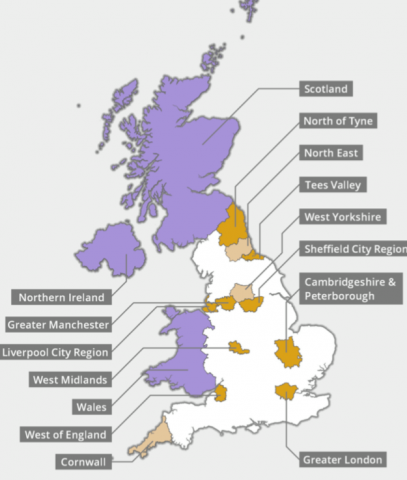Calls for 'Devo-max' for Cornwall

Institute for Public Policy Research (IPPR), the UK’s pre-eminent progressive think tank calls for full devolution max for Cornwall as in other Celtic nations
Cornwall has “outgrown” its original devolution deal and a bold new approach is needed to set it on the path to “true” devolution seen in other Celtic nations, according to a new report.
The paper has been produced by the Institute for Public Policy Research (IPPR), the UK’s pre-eminent progressive think tank.
Sarah Longlands, director of IPPR North said: “The devolution agenda in the UK has lost momentum and particularly so in England where the process has been piecemeal and top down, driven by Whitehall.
“At a time when we face extraordinary challenges, places like Cornwall need the power and resources to be able to get on and get the job done, rather than wait for central government to make the next move.
“From the Cornish language, the seabed to skills and tax, too many aspects of Cornish life are determined by Whitehall.
“From our research, it is clear that Cornwall has made the best of the fairly limited decentralisation deal that it was originally offered.
“Given the impact of Covid on Cornwall’s hospitality industry and the uncertainty of Brexit, now is the time to give Cornwall real devolution which means that they have the economic powers and resources they need to support a strong and fair recovery.”
Cllr Julian German, leader of Cornwall Council, welcomed the findings.
He said: “Cornwall was the first and remains the only rural area with a deal.
“Through the powers we received we have been able to bring significant benefits to Cornwall which have had a really positive impact on our residents’ lives.
“Since the deal in 2015, alongside better public transport and more connectivity for Cornwall we have cut carbon emissions by making 1,000 homes cheaper to heat for the most vulnerable households every year, and have had the powers to match economic growth funds to local priorities such as pioneering renewable energy from ‘hot rocks’ deep underground.
“This coupled with the experience gained in the last six years underlines that we are best placed to understand and deliver what our communities need to secure Cornwall’s future.
“We have clearly now outgrown that initial deal, and have been calling, through our New Frontiers plan, for the devolution of powers and funding we need to thrive, especially in a post-Brexit world.
“It is time for Westminster to recognise and harnesses the contribution that rural regions like ours make to the rest of the country.
“In 2014, the Cornish were granted national minority status by the Government, a recognition of the rich cultural heritage our unique corner of the UK can boast.
“It gives us the same status as the other Celtic nations of the British Isles. However, we are still lagging far behind when it comes to the powers to decide our own future.
“We have seen how Wales and Scotland have been able to control their own response to the pandemic and in Cornwall we have been able to build on our own local expertise and our effective partnership approach to achieve significant community outreach through our own, highly effective track and trace system for the residents of Cornwall.
“It shows, when Cornwall is able to implement its own decision making using our own local knowledge, we are able to support our communities and tackle the specific challenges we face far more effectively than when we see policy decided centrally.
“The time has come for a far stronger devolution deal for Cornwall, to allow us to unlock the potential we possess.
“Cornwall is a Celtic nation – and it is time we are treated as one.”
The report looks at how Cornwall – the first rural region to have negotiated a devolution deal with Government – has used the powers in its 2015 deal to deliver real benefits for residents.
It cites Transport for Cornwall offering over 100 new buses, smart ticketing and fully integrated timetables across public transport which is a rural “first” for the UK.
More climate friendly travel is not the only way Cornwall’s devolved powers are helping tackle climate change.
The report states: “Despite the progress made, Cornwall has now outgrown its current devolution deal.
“What is needed is a significant strengthening of devolution arrangements through legislative change in Westminster, setting Cornwall on the path to true devolution on an equal basis with Scotland, Wales and Northern Ireland.
“Devolution is a work in progress across the UK. The devolution white paper should initiate an ambitious programme of change for a new relationship between the centre and the rest of the country.”
Calling for a bold new approach, the report notes that so-called “devolution” deals with English regions rarely relinquish real power from the centre, while in the latest surveys for Government around two in three people in Cornwall (64%) say too many decisions affecting their area are made outside it.
IPPR’s report looks to the true devolution of powers and funding to the other Celtic nations and argues that the time is right to set Cornwall on the path to true devolution with the powers to decide strategy and policy for Cornwall within agreed areas – for example, education, health and planning – and be responsible for overseeing implementation and delivery within Cornwall.
Link to report: https://www.ippr.org/publication/why-devolution-matters-the-case-of-cornwall
Image: calls for more internal self rule are growing in Cornwall. Meanwhile, support continues to grow for the Northern Independence Party in northern England ( https://www.freethenorth.co.uk ) and the Yorkshire Party (https://www.yorkshireparty.org.uk) In Scotland the SNP appear to be heading towards a landslide result in the elections to the Scottish Parliament and in Wales, the 'Yes Cymru' cross party campaign group ( https://www.yes.cymru ) growing at a remarkable rate. Times are changing as more nations and regions look away from Westminster for a more satisfactory arrangement.





